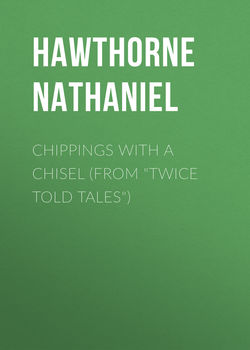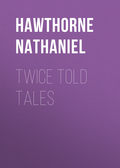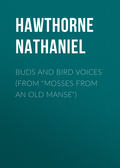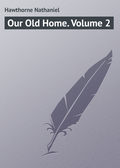
000
ОтложитьЧитал
“No, no,” replied the sculptor, shaking his head, “there is a good deal of comfort to be gathered from these little old scraps of poetry; and so I always recommend them in preference to any new-fangled ones. And somehow, they seem to stretch to suit a great grief, and shrink to fit a small one.”
It was not seldom that ludicrous images were excited by what took place between Mr. Wigglesworth and his customers. A shrewd gentlewoman, who kept a tavern in the town, was anxious to obtain two or three gravestones for the deceased members of her family, and to pay for these solemn commodities by taking the sculptor to board. Hereupon a fantasy arose in my mind, of good Mr. Wigglesworth sitting down to dinner at a broad, flat tombstone, carving one of his own plump little marble cherubs, gnawing a pair of cross-bones, and drinking out of a hollow death’s-head, or perhaps a lachrymatory vase, or sepulchral urn; while his hostess’s dead children waited on him at the ghastly banquet. On communicating this nonsensical picture to the old man, he laughed heartily, and pronounced my humor to be of the right sort.
“I have lived at such a table all my days,” said he, “and eaten no small quantity of slate and marble.”
“Hard fare!” rejoined I, smiling; “but you seemed to have found it excellent of digestion, too.”
A man of fifty, or thereabouts, with a harsh, unpleasant countenance, ordered a stone for the grave of his bitter enemy with whom he had waged warfare half a lifetime, to their mutual misery and ruin. The secret of this phenomenon was, that hatred had become the sustenance and enjoyment of the poor wretch’s soul; it had supplied the place of all kindly affections; it had been really a bond of sympathy between himself and the man who shared the passion; and when its object died, the unappeasable foe was the only mourner for the dead. He expressed a purpose of being buried side by side with his enemy.
“I doubt whether their dust will mingle,” remarked the old sculptor to me; for often there was an earthliness in his conceptions.
“O yes,” replied I, who had mused long upon the incident; “and when they rise again, these bitter foes may find themselves dear friends. Methinks what they mistook for hatred was but love under a mask.”
A gentleman of antiquarian propensities provided a memorial for an Indian of Chabbiquidick, one of the few of untainted blood remaining in that region, and said to be an hereditary chieftain, descended from the sachem who welcomed Governor Mayhew to the Vineyard. Mr. Wigglesworth exerted his best skill to carve a broken bow and scattered sheaf of arrows, in memory of the hunters and warriors whose race was ended here; but he likewise sculptured a cherub, to denote that the poor Indian had shared the Christian’s hope of immortality.
“Why,” observed I, taking a perverse view of the winged boy and the bow and arrows, “it looks more like Cupid’s tomb than an Indian chief’s!”
“You talk nonsense,” said the sculptor, with the offended pride of art; he then added, with his usual good-nature, “How can Cupid die when there are such pretty maidens in the Vineyard?”
“Very true,” answered I; and for the rest of the day I thought of other matters than tombstones.
At our next meeting I found him chiselling an open book upon a marble headstone, and concluded that it was meant to express the erudition of some black-letter clergyman of the Cotton Mather school. It turned out, however, to be emblematical of the scriptural knowledge of an old woman who had never read anything but her Bible; and the monument was a tribute to her piety and good works, from the Orthodox church, of which she had been a member. In strange contrast with this Christian woman’s memorial, was that of an infidel, whose gravestone, by his own direction, bore an avowal of his belief that the spirt within him would be extinguished like a flame, and that the nothingness whence he sprang would receive him again. Mr. Wigglesworth consulted me as to the propriety of enabling a dead man’s dust to utter this dreadful creed.







